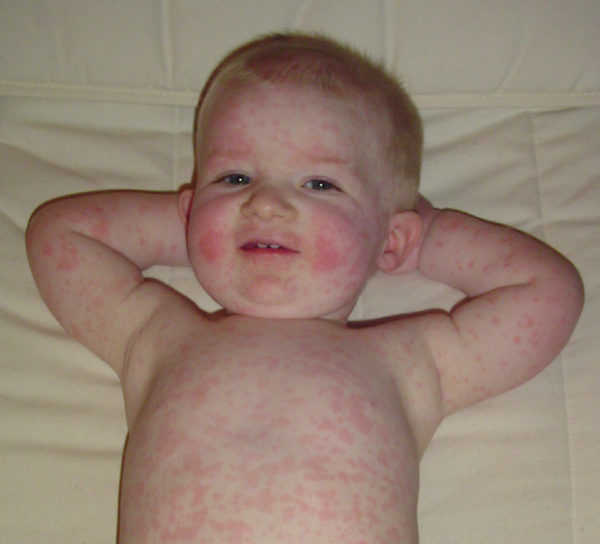
Fifth disease is a common childhood illness that causes very mild symptoms including a distinctive red rash. It is called fifth disease because it’s the fifth of five common viral rash diseases. (Measles, rubella, chickenpox and roseola are the others).
The most notable symptom of fifth disease is a red, blotchy rash that starts on the cheeks and spreads to the rest of the body, hence the nickname “slapped cheek disease.” Research indicates 40 to 60 percent of people have evidence of a past infection but because symptoms are so mild, most people don’t remember having it.
What Causes Fifth Disease?
Fifth disease is caused by the parvovirus B19. While the name is similar to a virus that causes intestinal distress in animals, the two are not related and neither virus can be passed between humans and pets. Symptoms appear four to 14 days after exposure to parvovirus B19.
Symptoms of Fifth Disease
Symptoms of fifth disease are mild and usually start with:
- Mild headache,
- Low-grade fever,
- Runny nose,
- Upset stomach,
- Joint pain (usually occurs in adults instead of children).
If it weren’t for the rash that appears several days after symptoms start, you might not even know your baby was sick. The rash starts on the cheeks and will appear as blotchy, bright red patches. After a few days, the rash spreads to the trunk, arms, legs, buttocks, soles of feet or palms of hands. The rash can be itchy, especially on the feet. The redness lasts anywhere from a week to 10 days but can appear intermittently for several weeks especially after your baby spends time in the sun.
Should I Take My Baby to a Doctor?
Probably not. Fifth disease is a very mild illness which shouldn’t require a doctor’s care. Exceptions are children with weakened immune systems or anemia. Women who are pregnant are also at risk as unborn babies can develop fetal anemia if exposed to parvovirus B19.
Can Fifth Disease Be Prevented?
There is not an immunization for fifth disease which is passed from person to person through close contact. The best way to prevent the infection is by frequent hand washing, keeping your baby away from people who are sick and washing toys and pacifiers often.
Since symptoms are so mild, it’s often difficult to tell if someone is ill with fifth disease until the rash appears. However, once the rash appears, the person is no longer contagious. And after you have parvovirus B19, you are immune and probably won’t contract the illness again.
